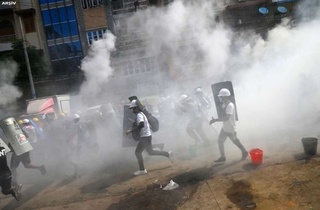“As of March 30, a total of (2608) people are detained in relation to the attempted military coup on February 1, of them (37) are sentenced. A further (120) people have been issued arrest warrants. We have not completed verification of all recently released detainees over the last 6 days, but are continuing to update the list of names who were released,” said the Assistance Association for Political Prisoners (AAPP), an independent non-profit organization founded by Burmese former political prisoners living in exile.
“The junta is committing atrocities every day in many townships, South Dagon township in Yangon Region was the scene of particularly severe violence, with many killed and injured by so-called police and military,” it added.
The organization also said that a civilian was burnt to death in South Dagon’s violent crackdown Monday night.
DAILY UPDATE (30/03)
521 killed by this junta coup since 1 Feb
2608 still detained
120 have been issued arrest warrants#WhatsHappeningInMaynmar
brief https://t.co/l8aRGBZO7j
detained https://t.co/JMgSWKIIIv
fatalities https://t.co/Wn87bMt5aE
released https://t.co/qgZvatKB35 pic.twitter.com/GXFBwpCXdf
A coup d'état began in Myanmar on the morning of 1 February when democratically elected members of Myanmar's ruling party, the National League for Democracy, were deposed by the Tatmadaw—Myanmar's military—which vested power in a stratocracy.
The Tatmadaw proclaimed a year-long state of emergency and declared power had been vested in Commander-in-Chief of Defense Services Min Aung Hlaing. It declared the results of the November 2020 general election invalid and stated its intent to hold a new election at the end of the state of emergency.
The coup d'état occurred the day before the Parliament of Myanmar was due to swear in the members elected at the 2020 election, thereby preventing this from occurring.
President Win Myint and State Counsellor Aung San Suu Kyi were detained, along with ministers, their deputies, and members of Parliament.
Civil resistance efforts have emerged within the country, in opposition to the coup, in numerous forms, including acts of civil disobedience, labor strikes, a military boycott campaign, a pot-banging movement, a red ribbon campaign, public protests, and formal recognition of the election results by elected representatives. (ILKHA)



 Dünya
Dünya
 Dünya
Dünya
 Dünya
Dünya
 Güncel
Güncel
 Güncel
Güncel
 Güncel
Güncel
 Güncel
Güncel
 Dünya
Dünya
 Güncel
Güncel
 Güncel
Güncel





